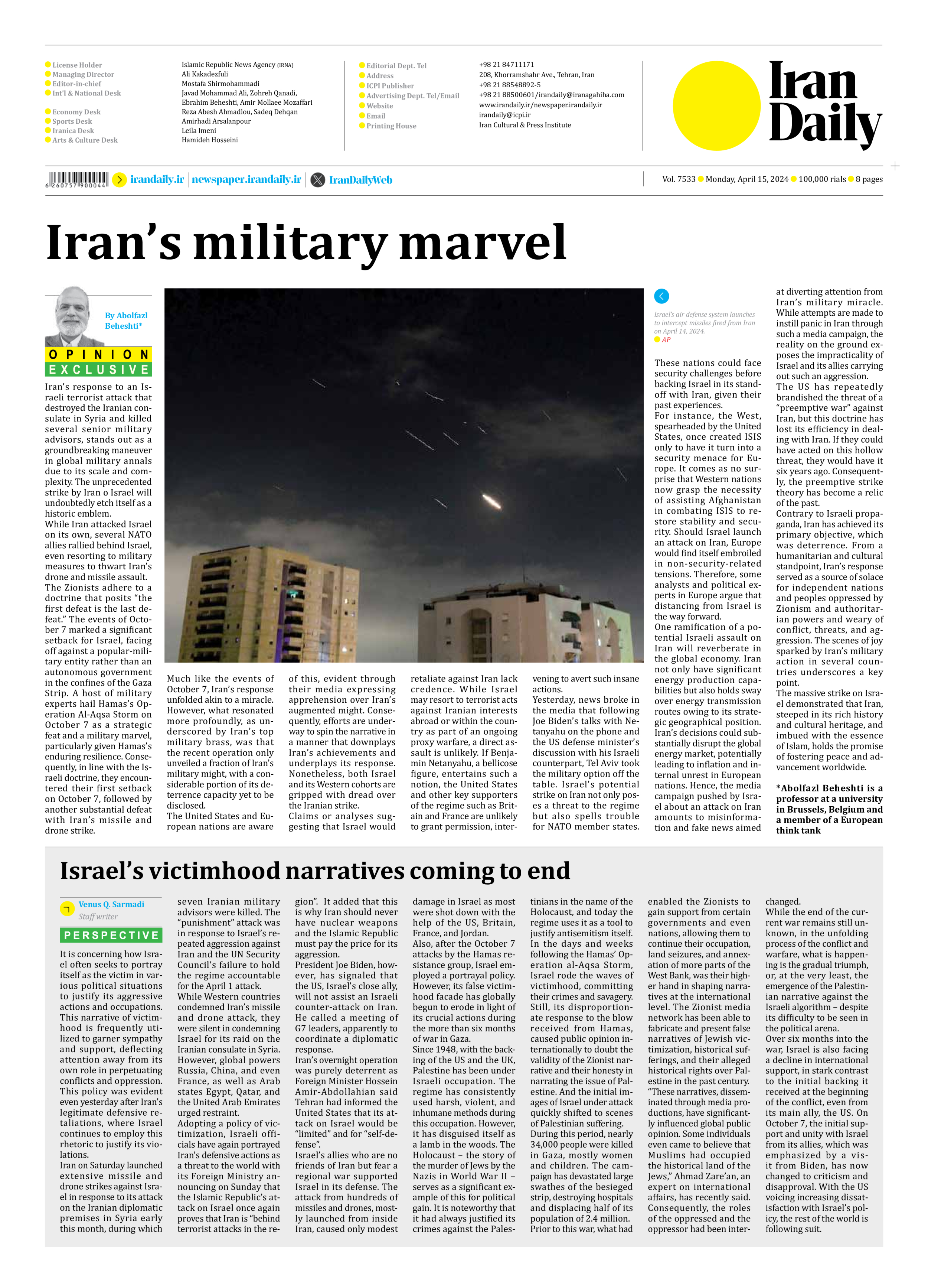
Israel’s victimhood narratives coming to end
Venus Q. Sarmadi
Staff writer
It is concerning how Israel often seeks to portray itself as the victim in various political situations to justify its aggressive actions and occupations. This narrative of victimhood is frequently utilized to garner sympathy and support, deflecting attention away from its own role in perpetuating conflicts and oppression. This policy was evident even yesterday after Iran’s legitimate defensive retaliations, where Israel continues to employ this rhetoric to justify its violations.
Iran on Saturday launched extensive missile and drone strikes against Israel in response to its attack on the Iranian diplomatic premises in Syria early this month, during which seven Iranian military advisors were killed. The “punishment” attack was in response to Israel’s repeated aggression against Iran and the UN Security Council’s failure to hold the regime accountable for the April 1 attack.
While Western countries condemned Iran’s missile and drone attack, they were silent in condemning Israel for its raid on the Iranian consulate in Syria. However, global powers Russia, China, and even France, as well as Arab states Egypt, Qatar, and the United Arab Emirates urged restraint.
Adopting a policy of victimization, Israeli officials have again portrayed Iran’s defensive actions as a threat to the world with its Foreign Ministry announcing on Sunday that the Islamic Republic’s attack on Israel once again proves that Iran is “behind terrorist attacks in the region”. It added that this is why Iran should never have nuclear weapons and the Islamic Republic must pay the price for its aggression.
President Joe Biden, however, has signaled that the US, Israel’s close ally, will not assist an Israeli counter-attack on Iran. He called a meeting of G7 leaders, apparently to coordinate a diplomatic response.
Iran’s overnight operation was purely deterrent as Foreign Minister Hossein Amir-Abdollahian said Tehran had informed the United States that its attack on Israel would be “limited” and for “self-defense”.
Israel’s allies who are no friends of Iran but fear a regional war supported Israel in its defense. The attack from hundreds of missiles and drones, mostly launched from inside Iran, caused only modest damage in Israel as most were shot down with the help of the US, Britain, France, and Jordan.
Also, after the October 7 attacks by the Hamas resistance group, Israel employed a portrayal policy. However, its false victimhood facade has globally begun to erode in light of its crucial actions during the more than six months of war in Gaza.
Since 1948, with the backing of the US and the UK, Palestine has been under Israeli occupation. The regime has consistently used harsh, violent, and inhumane methods during this occupation. However, it has disguised itself as a lamb in the woods. The Holocaust – the story of the murder of Jews by the Nazis in World War II – serves as a significant example of this for political gain. It is noteworthy that it had always justified its crimes against the Palestinians in the name of the Holocaust, and today the regime uses it as a tool to justify antisemitism itself.
In the days and weeks following the Hamas’ Operation al-Aqsa Storm, Israel rode the waves of victimhood, committing their crimes and savagery. Still, its disproportionate response to the blow received from Hamas, caused public opinion internationally to doubt the validity of the Zionist narrative and their honesty in narrating the issue of Palestine. And the initial images of Israel under attack quickly shifted to scenes of Palestinian suffering.
During this period, nearly 34,000 people were killed in Gaza, mostly women and children. The campaign has devastated large swathes of the besieged strip, destroying hospitals and displacing half of its population of 2.4 million.
Prior to this war, what had enabled the Zionists to gain support from certain governments and even nations, allowing them to continue their occupation, land seizures, and annexation of more parts of the West Bank, was their higher hand in shaping narratives at the international level. The Zionist media network has been able to fabricate and present false narratives of Jewish victimization, historical sufferings, and their alleged historical rights over Palestine in the past century.
“These narratives, disseminated through media productions, have significantly influenced global public opinion. Some individuals even came to believe that Muslims had occupied the historical land of the Jews,” Ahmad Zare’an, an expert on international affairs, has recently said. Consequently, the roles of the oppressed and the oppressor had been interchanged.
While the end of the current war remains still unknown, in the unfolding process of the conflict and warfare, what is happening is the gradual triumph, or, at the very least, the emergence of the Palestinian narrative against the Israeli algorithm – despite its difficulty to be seen in the political arena.
Over six months into the war, Israel is also facing a decline in international support, in stark contrast to the initial backing it received at the beginning of the conflict, even from its main ally, the US. On October 7, the initial support and unity with Israel from its allies, which was emphasized by a visit from Biden, has now changed to criticism and disapproval. With the US voicing increasing dissatisfaction with Israel’s policy, the rest of the world is following suit.







